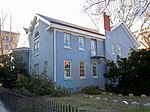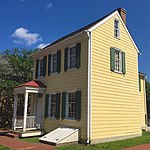Trenton is the capital city of the U.S. state of New Jersey and the seat of Mercer County. It was the capital of the United States from November 1 until December 24, 1784. Trenton and Princeton are the two principal cities of the Trenton–Princeton metropolitan statistical area, which encompasses those cities and all of Mercer County for statistical purposes and constitutes part of the New York combined statistical area by the U.S. Census Bureau. However, Trenton directly borders the Philadelphia metropolitan area to its west, and the city was part of the Philadelphia combined statistical area from 1990 until 2000.As of the 2020 United States census, Trenton was the state's 10th-most-populous municipality, with a population of 90,871, an increase of 5,958 (+7.0%) from the 2010 census count of 84,913, which in turn had reflected a decline of 490 (−0.6%) from the 85,403 counted in the 2000 census. The Census Bureau's Population Estimates Program calculated that the city's population was 89,661 in 2022, ranking the city the 382nd-most-populous in the country. Trenton is the only city in New Jersey that serves three separate commuter rail transit systems (Amtrak, NJ Transit, and SEPTA), and the city has encouraged a spate of transit-oriented development since 2010.Trenton dates back at least to June 3, 1719, when mention was made of a constable being appointed for Trenton while the area was still part of Hunterdon County. Boundaries were recorded for Trenton Township as of March 2, 1720. A courthouse and jail were constructed in Trenton around 1720, and the Freeholders of Hunterdon County met annually in Trenton.Abraham Hunt was appointed in 1764 as Trenton's first Postmaster. On November 25, 1790, Trenton became New Jersey's capital, and by November 13, 1792, the City of Trenton was formed within Trenton Township. Trenton Township was incorporated as one of New Jersey's initial group of 104 townships by an act of the New Jersey Legislature on February 21, 1798. On February 22, 1834, portions of Trenton Township were taken to form Ewing Township. The remaining portion of Trenton Township was absorbed by the city on April 10, 1837. A series of annexations took place over a 50-year period with the city absorbing South Trenton (April 14, 1851), portions of Nottingham Township (April 14, 1856), Chambersburg Township and Millham Township (both on March 30, 1888), and Wilbur (February 28, 1898). Portions of Ewing Township and Hamilton Township were annexed to Trenton on March 23, 1900.







